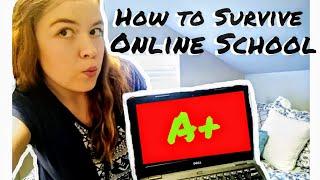9 tips to plan & study for online classes and save your grades
Description
Sign up for CuriosityStream & Nebula and start learning today: https://curiositystream.com/studycorner
OneNote videos:
- https://youtu.be/cOeOqR2KvCs
- https://youtu.be/luWAZmm5A2E
After programming your devices to transform into productivity machines, [**make the best use of the software available]** to you. Rely on freeware like OneNote to take the best possible class notes. The secret is using simplified language, relying on a strict color coding and formatting scheme and making sure to incorporate voice files, PDF documents and other resources that are relevant to your topic and allow you to consolidate the learning material. The good thing about learning to take your notes in digital format is that it allows you to easily share them with your learning peers or ask feedback from your lecturer. I have a couple of OneNote videos where I show you my tips and tricks on how to take the best possible notes for classes, which I will link in the description box below.
3. **[Use split screen**] Split screen will be your new best friend - either you use windows, where that functionality is automatically available, or do it manually or through third party apps on your mac, having access to multiple apps at a time will boost how much you can do and glance at, at the same time. Tracking your tasks with your digital calendar, while having your online classroom webpage open in a corner and taking notes using half the screen will give you a panoramic view of your work and will help you type down small notes, questions or reminders while you engage in your coursework.
4. Be ready to **[prepare and devote extra time]** to your lessons. The dynamics of online classes rely a lot on reading provided materials, taking notes accordingly and essentially take in a lot of information that would otherwise be toned down in presential lessons. This extra workload will force you to adapt to a different learning routine and to pay more attention to details, secondary resources of information and learning materials including visual aids. What will help you managing this is being able to carefully catalog all of these materials in an organized digital folder and index their titles, contents and date of assignment in the note taking software of your preference.
5. You'll have to rethink your summarizing and consolidating techniques **[change your summarizing techniques]** and that's because an overabundance of materials and information will require constant cross-checking of facts, definitions and other details. Forget typing down long paragraphs and using complicated language during note-taking sessions because never in your life it has been more important to create study guides - that is, summaries of consolidated information where you're able to jot down everything you've learned in a shortened format. Each summary should correspond to a chapter and develop on or at least mention every single topic mentioned so far during your lessons. Creating a study guide in digital format can be very different from doing so in paper, so to help you create effective and interesting study materials I'll be uploading a tutorial on how I create them using OneNote.
6. Learn to be equally strict with your schedule **[have a strict schedule]**. The lack of physical boundaries between your house and your school will blur the lines between leisure and work. A good way to create invisible, but equally effective boundaries is using the calendar blocking technique.
7. Prepare ahead for classes and make a ritual out of logging in early **[log in early]**. I suggest you to get familiar with the virtual classroom software tool and looking at the tools available to you, like private chatting, community notes or the possibility to record the class. Also, just memorize *in your brain* where the mute button is because that may save your life from incredibly embarrassing situations.
8. Don't be afraid to go beyond listening to your lectures and **[get engaged]** by participating in your classes and contacting other classmates through virtual study groups where you can share questions and ideas, as well as share study materials. Slack is a great place to do this since you can easily chat with multiple members as well as share files and create specific channels inside your main workspace.
9. Whenever you have trouble practicing time management, remember you should be treating studying like a full-time job. Show up, schedule in your assignments, tasks and assessments in an organized way, share your knowledge and notes and set daily goals and task lists like your boss was looking over your shoulder and supervising your work. This change in mindset will be more important to your long-term success than incorporating all the study hacks you can find online into your study routine.
FTC: This video is sponsored by CuriosityStream.





















Comments